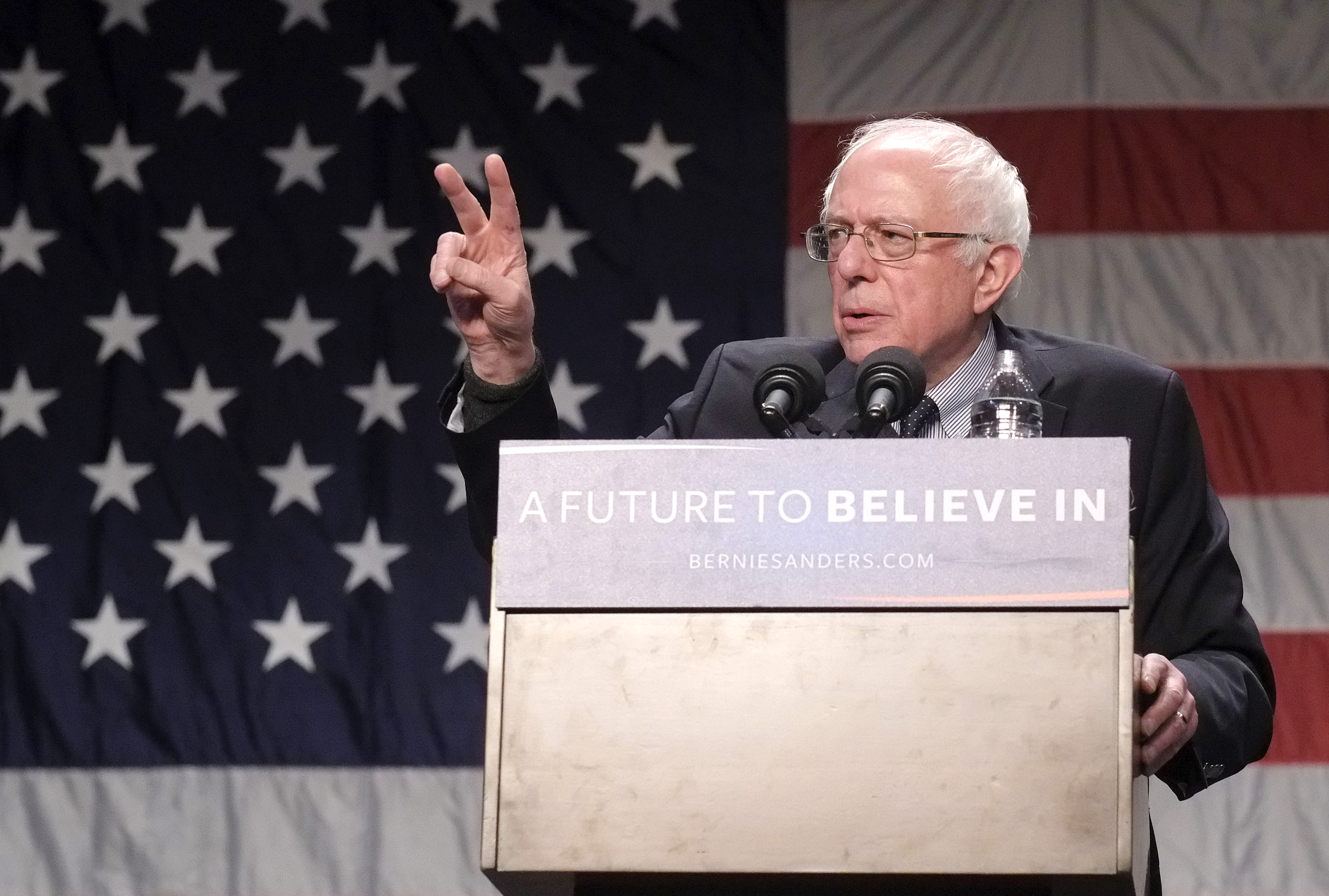Bernie Sanders is not nearly as progressive as you think he is
He's certainly to Hillary Clinton's left. But his record on several key issues is awfully shaky for a self-declared socialist.


A free daily email with the biggest news stories of the day – and the best features from TheWeek.com
You are now subscribed
Your newsletter sign-up was successful
Sen. Bernie Sanders (I-Vt.) has been doing some serious sub-tweeting about Hillary Clinton.
Following her ever-so-narrow win in Iowa, Clinton touted her bona fides as a "progressive who gets things done," much to Sanders' distaste. "Most progressives I know were against the war in Iraq," Sanders tweeted, without specifically naming Clinton. "One of the worst foreign policy blunders in the history of the United States."
Indeed, measured against Clinton, Sanders is right to claim the mantle of progressivism. The former secretary of state is (and should be) dogged by her close and profitable ties to Wall Street and big business, and her foreign policy is consistently hawkish in a style Dick Cheney would admire.
The Week
Escape your echo chamber. Get the facts behind the news, plus analysis from multiple perspectives.

Sign up for The Week's Free Newsletters
From our morning news briefing to a weekly Good News Newsletter, get the best of The Week delivered directly to your inbox.
From our morning news briefing to a weekly Good News Newsletter, get the best of The Week delivered directly to your inbox.
But evaluated on the basis of his own lengthy record, Sanders is not as progressive as he makes himself out to be on at least three big issues: guns, criminal justice reform, and — despite the Iraq vote — foreign policy.
Sanders' mixed history on guns is a chink in his progressive armor that Clinton aims at whenever she has the chance. "If we're going to go into labels, I don't think it was particularly progressive to vote against the Brady Bill five times," she said at the latest debate. "I don't think it was progressive to vote to give gun makers and sellers immunity."
Sanders often sounds like a gun control hardliner. "The president is right: Condolences are not enough," he said after a shooting this past fall. "We've got to do something … We need sensible gun control legislation." But Clinton's claims are still basically accurate. Per this Politifact tally of Sanders' significant gun votes in Congress, he backs additional control about half the time, albeit with a trend toward more gun regulation in recent years. Sanders' staff has tried to explain his comparative conservatism here as part and parcel of representing Vermont, a left-wing but gun-friendly state, but either way, his is hardly a super-progressive record on guns.
Then there's criminal justice reform, an issue which has netted Sanders the endorsement of several well-known figures in the Black Lives Matter movement. Speaking in New Hampshire the same day as the subtweets, Sanders vowed, "There will be no president who will fight harder to end institutional racism" than he will.
A free daily email with the biggest news stories of the day – and the best features from TheWeek.com
"We have got to reform a very, very broken criminal justice system," he added. "It breaks my heart, and I know it breaks the hearts of millions of people in this country, to see videos on television of unarmed people, often African-Americans, shot by police. That has got to end."
The rhetoric is right. But Sanders' record says otherwise.
For instance, Sanders sounded a similar note back in April 1994, decrying America's ballooning prison population and its ties to poverty. But just one week later, he voted to pass the Violent Crime Control and Law Enforcement Act of 1994, a centerpiece of Bill Clinton's "tough on crime" shtick, which, among other things, mandated a life sentence for anyone convicted of three drug crimes; expanded the list of death penalty crimes; lowered the age at which a juvenile could be tried as an adult to just 13; and appropriated billions to expand the prison system and hire 100,000 new police officers.
That's the biggest blot on Sanders' criminal justice record, but it's not the only one. In 1995, he voted against a measure which would have prohibited police acquisition of tanks and armored vehicles like those he critiqued in Ferguson. Likewise, in 1998, Sanders prioritized gun control over prison reform and voted for mandatory minimum sentences for crimes where the offender carried, brandished, and/or fired a gun. The gun in question doesn't have to be used for the criminal act, so, for example, a nonviolent crime like smoking pot while carrying a legally owned weapon would trigger the mandatory minimum.
Now that criminal justice reform is en vogue, Sanders has shifted — but it's an uncomfortable fit. His responses to Ferguson highlighted poverty more than police brutality; and the bill to ban private federal prisons he introduced this past fall had a clearer connection to his socialist economic policies than anything else. Alex Friedmann of the Human Rights Defense Center, whom Sanders consulted in crafting the proposal, says, "It appears to be more for political purposes than to actually address the many problems in our criminal justice system."
Finally, foreign policy. Sanders regularly touts his vote against invading Iraq in 2003, and that is unquestionably to his credit. But then there's the rest of his record on matters of war and peace, which figures heavily into the wariness many actual socialists maintain toward Sanders' campaign.
As Stephen M. Walt writes at Foreign Policy, Sanders is hardly "a reflexive dove." He intends to retain President Obama's drone program if elected. He voted in favor of Clinton's pet intervention in Libya, in favor of the interminable war in Afghanistan, and even in favor of multiple funding measures to maintain the war in Iraq — a repeated "yes" to bankrolling the very conflict he so often boasts of opposing.
Sanders also speaks enthusiastically of coalition-based wars. "I would say that the key doctrine of the Sanders administration would be no, we cannot continue to do it alone; we need to work in coalition," he said at the last debate. In practice, though, that doesn't mean no more wars; it means non-Americans fighting and dying in pursuit of American goals.
Writing at the socialist Jacobin Magazine, Paul Heideman contends that though "Sanders is willing to criticize many of the most egregious over-extensions of American empire" — like the invasion of Iraq — "it seems he has no interest in contesting the American suppression of democracy across the globe." The candidate cheered King Abdullah II of Jordan for his opposition to ISIS, of which Heideman snarks, "It is never a good look for a socialist to praise a monarch."
More broadly, it is never a good look for a progressive to have such an uncertain record in three major policy areas. Running against Clinton, Sanders can rightfully lay claim to progressive voters' support. But they could be forgiven for suspecting he is less one of their own than his tweeting suggests.
Bonnie Kristian was a deputy editor and acting editor-in-chief of TheWeek.com. She is a columnist at Christianity Today and author of Untrustworthy: The Knowledge Crisis Breaking Our Brains, Polluting Our Politics, and Corrupting Christian Community (forthcoming 2022) and A Flexible Faith: Rethinking What It Means to Follow Jesus Today (2018). Her writing has also appeared at Time Magazine, CNN, USA Today, Newsweek, the Los Angeles Times, and The American Conservative, among other outlets.
-
 How the FCC’s ‘equal time’ rule works
How the FCC’s ‘equal time’ rule worksIn the Spotlight The law is at the heart of the Colbert-CBS conflict
-
 What is the endgame in the DHS shutdown?
What is the endgame in the DHS shutdown?Today’s Big Question Democrats want to rein in ICE’s immigration crackdown
-
 ‘Poor time management isn’t just an inconvenience’
‘Poor time management isn’t just an inconvenience’Instant Opinion Opinion, comment and editorials of the day
-
 The billionaires’ wealth tax: a catastrophe for California?
The billionaires’ wealth tax: a catastrophe for California?Talking Point Peter Thiel and Larry Page preparing to change state residency
-
 Mamdani vows big changes as New York’s new mayor
Mamdani vows big changes as New York’s new mayorSpeed Read
-
 Bari Weiss’ ‘60 Minutes’ scandal is about more than one report
Bari Weiss’ ‘60 Minutes’ scandal is about more than one reportIN THE SPOTLIGHT By blocking an approved segment on a controversial prison holding US deportees in El Salvador, the editor-in-chief of CBS News has become the main story
-
 Has Zohran Mamdani shown the Democrats how to win again?
Has Zohran Mamdani shown the Democrats how to win again?Today’s Big Question New York City mayoral election touted as victory for left-wing populists but moderate centrist wins elsewhere present more complex path for Democratic Party
-
 Millions turn out for anti-Trump ‘No Kings’ rallies
Millions turn out for anti-Trump ‘No Kings’ ralliesSpeed Read An estimated 7 million people participated, 2 million more than at the first ‘No Kings’ protest in June
-
 Ghislaine Maxwell: angling for a Trump pardon
Ghislaine Maxwell: angling for a Trump pardonTalking Point Convicted sex trafficker's testimony could shed new light on president's links to Jeffrey Epstein
-
 The last words and final moments of 40 presidents
The last words and final moments of 40 presidentsThe Explainer Some are eloquent quotes worthy of the holders of the highest office in the nation, and others... aren't
-
 The anger fueling the Bernie Sanders and Alexandria Ocasio-Cortez barnstorming tour
The anger fueling the Bernie Sanders and Alexandria Ocasio-Cortez barnstorming tourTalking Points The duo is drawing big anti-Trump crowds in red states
